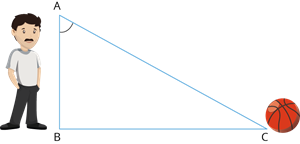
PUMPA - SMART LEARNING
எங்கள் ஆசிரியர்களுடன் 1-ஆன்-1 ஆலோசனை நேரத்தைப் பெறுங்கள். டாப்பர் ஆவதற்கு நாங்கள் பயிற்சி அளிப்போம்
Book Free DemoLet us learn how to solve real-life situations based on the angle of depression.
Example:
1. A man observes the ball, which is at a distance of 1.5 \ m from him. If the angle of depression is 45^{\circ}, then find the height of the man.
Solution:

Let AB denote the height of the man and BC denote the distance of the man from the ball.
From the given data, we have:
\theta = 45^{\circ}, and BC = 1.5 \ m
To find: The height of the man (AB).
Explanation:
In the right-angled \triangle ABC, tan \ \theta = \frac{BC}{AB}
tan \ 45^{\circ} = \frac{1.5}{AB}
1 = \frac{1.5}{AB}
AB = 1.5 \ m
Therefore, the height of the man is 1.5 \ m.
2. A man observes a ball that is at a distance of 1.2 \sqrt{3} \ m from him. If the height of the man is 1.2 \ m, then find the angle of depression.
Solution:

Let AB denote the height of the man and BC denote the distance of the man from the ball.
From the given data, we have:
AB = 1.2 \ m, and BC = 1.2 \sqrt{3} \ m
In the right-angled triangle ABC, tan \ \theta = \frac{BC}{AB}
tan \ \theta = \frac{1.2 \sqrt{3}}{1.2}
tan \ \theta = \sqrt{3}
\theta = 60^{\circ}
Therefore, the angle of depression is 60^{\circ}.
Important!
The angle of elevation and angle of depression are equal because they are alternate angles.
